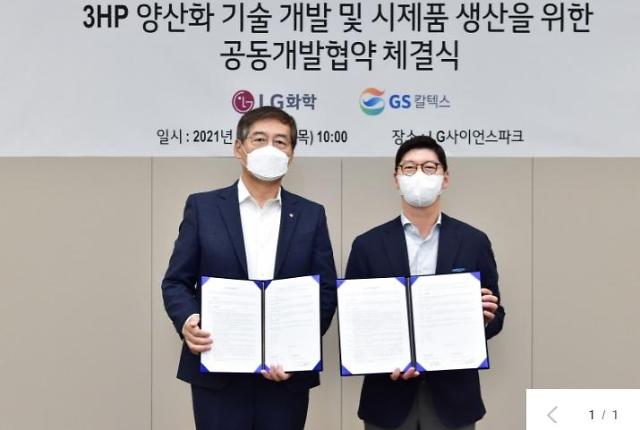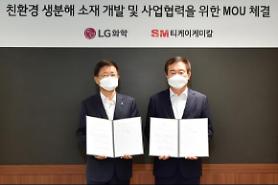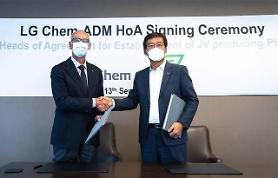
[Courtesy of LG Chem]
SEOUL -- LG Chem teamed up with GS Caltex, a major refiner in South Korea, to jointly develop mass-production technologies of 3-hydroxypropionic acid, which is a biodegradable plastic material produced through a microorganism fermenting process of bio-materials such as glucose and unrefined glycerol derived from vegetable oil.
3-hydroxypropionic acid (3HP) is drawing attention as a next-generation platform chemical that can be used as raw materials for a variety of materials including biodegradable plastic and super absorbent polymers used in diapers, paints, adhesives and glues, coating materials, and carbon fiber.
LG Chem used 3HP fermenting technologies to develop poly lactate 3-hydroxypropionate (PLH), a biodegradable material that can configure mechanical properties equivalent to synthetic resins. The goal is to produce a prototype by 2023.
"In this current period where carbon neutrality has become a global mega-trend, the fact that a company leading the oil refining industry and another leading the chemical industry is cooperating for the development and commercialization of sustainable new materials has great meaning," LG Chem CEO Shin Hak-cheol said in a statement on November 18.
LG Chem’s fermented production technology will be combined with GS Caltex’s process facility technologies. They would accelerate entry into biodegradable materials and bio-plastic markets through the production of a 3HP prototype from 2023.
"As microplastics have become a serious environmental issue, products that quickly decompose in the natural ecosystem will be able to create sustainable value in that it will eco-friendly consumption,” said GS Caltex President Hur Sae-hong.
South Korea nurtures the white biotechnology industry that focuses on the creation and distribution of biodegradable bioplastics. White biotechnology is an area of science that is devoted to using living cells collected from yeast, molds, microorganisms and plants, and enzymes to create products that can be easily degraded.
In October 2020, LG Chem developed a new biodegradable material using corn-based glucose and crude glycerol that can realize mechanical properties equivalent to synthetic resins for the first time in the world. LG Chem's new material can be applied to plastic bags, air cap buffers, disposable cups, foaming products and mask felts.
LG Chem is the first company to develop flexible lactic acid and polylactic acid (PLA). PLA is a biodegradable plastic based on lactic acid that is produced by fermenting and refining glucose extracted from corn and is mainly used for food packaging containers and tableware. It comprises an eco-friendly material that is naturally decomposed in several months by microorganisms under certain conditions.
In September 2021, LG Chem agreed with Archer Daniels Midland, a major American grain processing company, to set up a PLA joint factory in the United States for the production of corn-based raw materials for bioplastics.
Copyright ⓒ Aju Press All rights reserved.



